Cox breaks down one of biggest embarrassments in the Premier League era – for any club
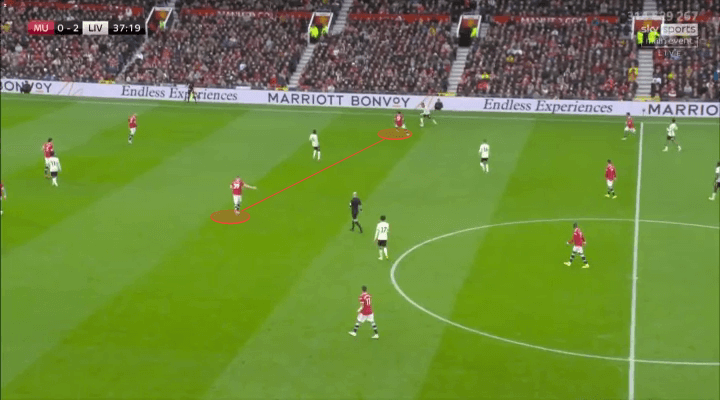
The final scoreline of a match doesn’t always tell the whole story. That has been one of the major themes of football analysis in recent years; the embracing of the ‘expected goals’ metric is, in part, because innovative thinkers realised that game results alone are ‘noisy’ and can sometimes be misleading.
But it’s not just about the underlying numbers. After all, look at the expected goals figures for Manchester United’s 5-0 loss to Liverpool on Sunday (3.44 to 1.50) and you might think they were unfortunate. Around 4-1 would have been more fitting.
But the xG numbers don’t account for the fact Liverpool stopped playing after getting their fifth on 50 minutes, not bothering to try to run up a historic scoreline. Tottenham Hotspur did the same last season in their own five-goal win at Old Trafford, or else United would surely have suffered a club-record defeat on both occasions.
The numbers don’t explain the extent to which United lost their heads, with Cristiano Ronaldo and Harry Maguire flirting with the possibility of a red card before Paul Pogba went over the top with a tackle that was more malicious than it was mistimed.
The numbers don’t fully show United’s complete lack of structure without possession, their approach to pressing being about individuals making pointless lone runs in an attempt to prove to us they’re working hard.
The numbers don’t show that one of Liverpool’s one-on-ones came from Marcus Rashford’s 60-yard through ball in behind his own defence for Mohamed Salah.
This was a complete humiliation and must rank as among the biggest embarrassments in the Premier League era, considering United have pretensions of competing with Liverpool — indeed, they finished above them last season.
Now, that’s a grand statement… but think about it.
There have been some dreadful performances in the near-three decades of the Premier League but, often, historic scorelines were harsh reflections of the balance of play.
In United’s 6-1 loss to Manchester City at Old Trafford a decade earlier to the day, for example, they were only 3-1 down after 88 minutes. They gambled late on and got exposed on the break.
At times, an early red card influences things — Southampton’s 9-0 loss to Leicester this week two years ago, where Ryan Bertrand was dismissed after 12 minutes when it was 1-0, springs to mind.
And sometimes you just have to accept that the financial inequalities within the Premier League mean that one side wouldn’t get a single player into the starting XI of their opponents, and therefore it’s not actually that ludicrous for, say, Norwich City to lose 7-0 to Chelsea once in a while.
But this was two sides on, theoretically, a similar level.
Liverpool started the season as third-favourites for the title, Manchester United were fourth-favourites — before they’d signed a five-time Ballon d’Or winner — yet here, Liverpool were 5-0 up after 50 minutes away at United.
The same problems are occurring repeatedly for United this season — they were obvious last weekend in their 4-2 defeat away to Leicester.
United weren’t a particularly good pressing side last season. Now, they are a truly dreadful one.
There is no cohesion between partnerships up and down the flanks — when a winger moves forward to close down, he doesn’t check that the full-back behind him is ready to do the same, and neither does his movement act as a trigger for that full-back. They end up inviting simple passes and one-twos beyond them, as the below example from Sunday involving Rashford shows.
When Naby Keita plays a backwards pass to Andrew Robertson, who is briefly on the right side of Liverpool’s defence, Rashford decides to unilaterally try to shut him down. There’s not a chance anyone can push up to get tight to Keita, and Rashford doesn’t press in a way that cuts off a return ball. So this sprint up the pitch does absolutely nothing, aside from make it simple for Liverpool to bypass him.
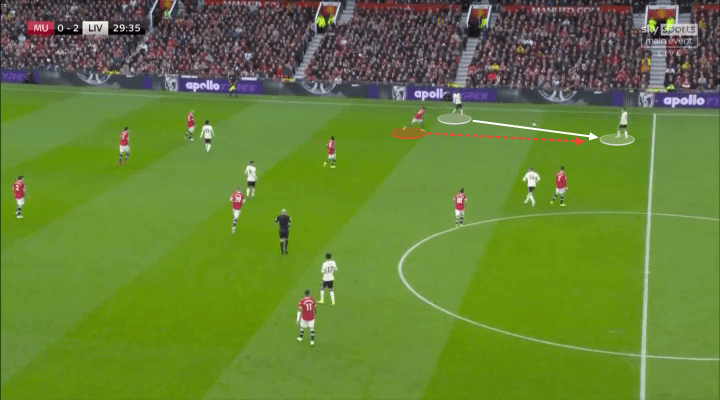
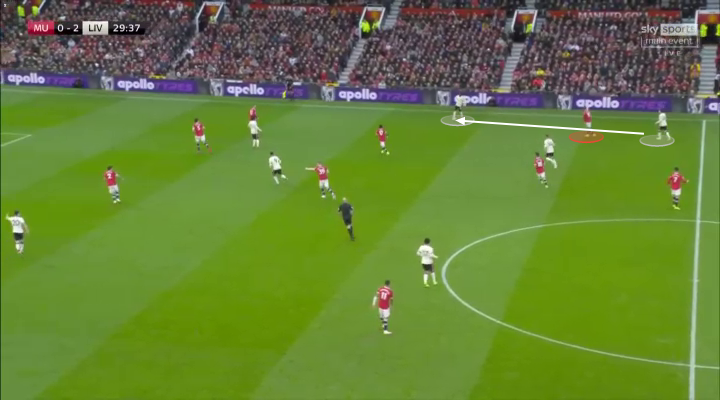
Centrally, Ronaldo and Bruno Fernandes wanted to close down Liverpool’s centre-backs, but there was no obvious plan for either of them to drop on to Jordan Henderson, who enjoyed acres of space in the middle of the pitch. In this example — with Rashford and Fernandes having briefly switched positions — Henderson could drop back behind United’s attacking duo to help build play, then push ahead of them to collect a forward pass under absolutely no pressure.
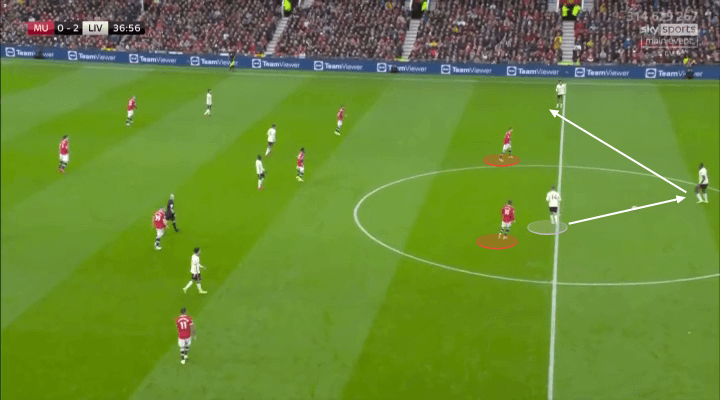
Ronaldo turns and sprints to show us he’s making an effort, but this is easy pickings for Liverpool.
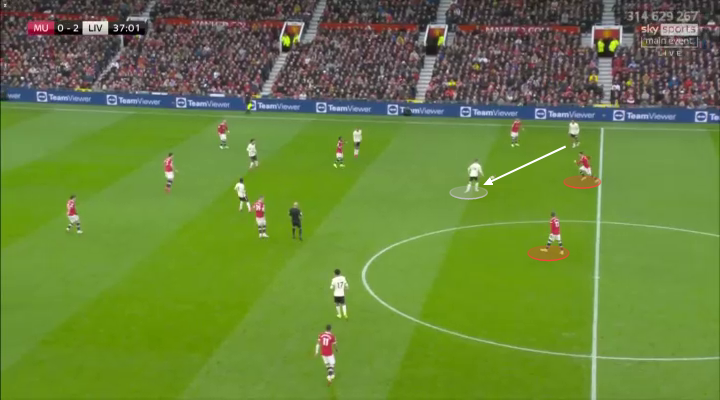
Henderson was never going to be the responsibility of Scott McTominay and Fred, who are, in simple terms, not good enough to play in a Champions League-level side, but are probably the right option in the centre as the most solid partnership available to Ole Gunnar Solskjaer.
They couldn’t take care of Henderson because they had to focus on Keita and James Milner (who was replaced early on by Curtis Jones), with Roberto Firmino drifting in behind them too — not that they coped particularly well with the Brazilian’s movements into their zone.
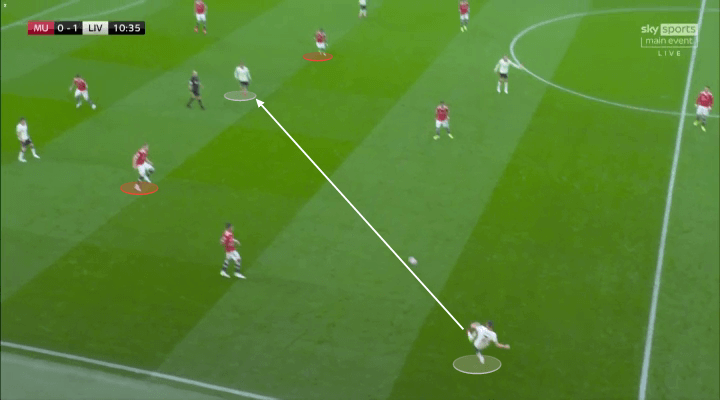
But they are repeatedly left exposed by the poor positioning of more talented team-mates, and that means their weaknesses are highlighted even more.
No central midfield duo can cope with this situation against a side as talented as Liverpool. McTominay spent the game pointing towards unmarked players, like below. Although to perform that task properly he would have needed to be an octopus.
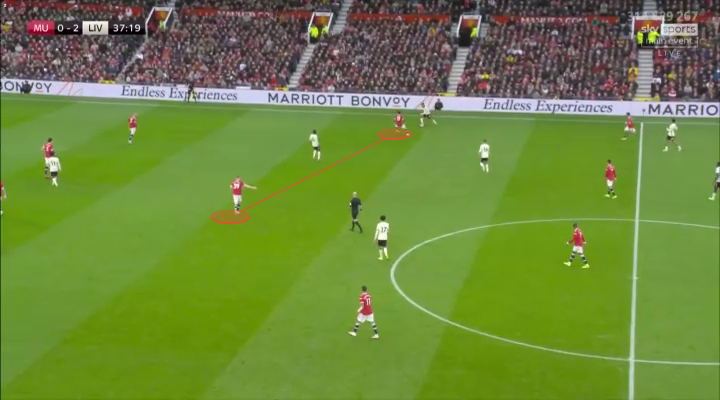
Curiously, this is all something of a new problem this season.
United were largely good without possession against the big sides last season. In six league matches against the other three clubs to finish in the top four — Manchester City, Chelsea and Liverpool — they kept five clean sheets. And while in four of those matches they didn’t manage to score themselves, the run of 0-0 draws suggested that the problems were going forward rather than at the back. Or, alternatively, that Solskjaer was overcompensating and picking a cautious side to try to hide their weaknesses at the back.
Solskjaer has actually devised some clever game plans against big sides in his near three years as United manager, often going for a counter-attacking shape without a designated striker, but the addition of Ronaldo this summer means that option is off the table. The real problems since Solskjaer succeeded Jose Mourinho have generally come when opponents have stood off and allowed United possession.
Now though, they lack cohesion without the ball, as well as with it.
United have, in fairness, won three of their last nine matches, but in all three they conceded the first goal and needed a late winner.
Again, the final scoreline doesn’t always tell the whole story.
United aren’t as good as their wins suggest, and this weekend they were even worse than a 5-0 loss would suggest.

 51
51 